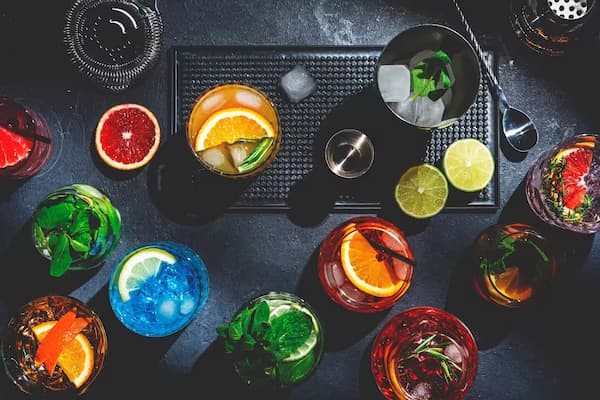Lemon bitters
With Lemon bitters you can make
About Lemon bitters
Incorporating lemon bitters into a cocktail can elevate the overall drinking experience by intensifying the flavors or adding a new layer of taste. It cuts through sweetness and provides balance, making it particularly useful in cocktails that might otherwise feel too heavy or sugary. Moreover, lemon bitters can serve as a substitute for fresh lemon juice or zest in a pinch, offering a longer shelf life and a more concentrated flavor profile. Whether used as a primary component or a subtle accent, lemon bitters are an indispensable tool in a mixologist's arsenal, adding complexity, enhancing flavors, and providing a finishing touch that rounds out the sensory experience of a well-crafted cocktail.
Q&A
What is the history behind lemon bitters?
Lemon bitters, part of the broader family of bitters used in mixology, have a lineage tracing back to the 19th century. Originally developed as medicinal tinctures, bitters evolved into key cocktail ingredients during the golden age of cocktails in the late 1800s and early 1900s. Lemon bitters specifically gained popularity for their ability to add a refreshing citrus twist to alcoholic beverages. The exact origin of lemon bitters is hard to pinpoint, but they share a common heritage with other citrus bitters, having been embraced by bartenders for their ability to enhance and balance cocktails with their bright, tangy notes. Over time, as cocktail culture expanded, so too did the appreciation and utilization of lemon bitters in mixology.
What makes lemon bitters unique compared to other types of bitters?
Lemon bitters stand out in the diverse world of bitters due to their distinct citrus flavor profile. Unlike other bitters that might focus on herbal, floral, or spicier notes, lemon bitters provide a pronounced lemon essence that brings a bright and tangy element to cocktails. This is achieved through the meticulous process of infusing alcohol with lemon peels, pith, and juice, along with selected botanicals, to capture the zest and acidity of lemon. This unique combination of bitter and citrus qualities makes lemon bitters a versatile and invaluable ingredient in mixology, capable of enhancing a wide range of cocktails by cutting through sweetness and adding depth.
How can you incorporate lemon bitters into cocktails?
Incorporating lemon bitters into cocktails is straightforward and can dramatically enhance the drink's flavor profile. Start by adding a few drops to your cocktail to introduce a bright, citrusy complexity. Lemon bitters work well in both clear and dark spirit-based cocktails. You can use them to add depth to a classic gin and tonic, bring balance to a sweet whiskey sour, or even update a traditional martini. Experiment by combining lemon bitters with other bitters to create a custom flavor profile. Always adjust to taste; even a small amount can significantly influence the cocktail's overall character.
Are there non-alcoholic alternatives to lemon bitters?
Yes, there are non-alcoholic alternatives to lemon bitters that can provide a similar citrusy and slightly bitter flavor profile for mocktails and other non-alcoholic beverages. These include lemon-flavored herbal extracts and citrus-infused syrups, which mimic the zest and tanginess without the alcohol content. When using these substitutes, it's important to adjust quantities based on their intensity and your taste preference, as they might be sweeter or less potent than alcoholic bitters. Experimenting with natural lemon zest or freshly squeezed lemon juice can also offer a refreshing burst of citrus flavor in non-alcoholic drink recipes.
What are some of the best cocktails to make with lemon bitters?
Lemon bitters are incredibly versatile and can elevate a multitude of cocktails. Classic pairings include adding a few drops to a Gin and Tonic or a Martini to introduce a refreshing citrus note. For something more innovative, incorporate them into a Whiskey Sour to balance out the sweetness with some tangy complexity, or add them to a Tom Collins for an extra layer of flavor. Lemon bitters also shine in non-traditional recipes, like a Lemon Bitter-Spritz or a Lemon Bitter Margarita, providing a distinct and lively twist to familiar cocktails. Their ability to complement both classic and contemporary drinks makes lemon bitters an essential ingredient in any mixologist’s collection.
Ingredients like Lemon bitters
Other Bar Stocks
How it works
Easily create your bar from the ingredients you have at home, and we'll show you what you can make with the ingredients you have to hand.
Once you've added this ingredient head to your My bar page and fill up everything else you have.
We'll also show you cocktails that can make by substituting what you have for one of the ingredients you don't, riffing on the original. Now go forth and create something delicious!
















